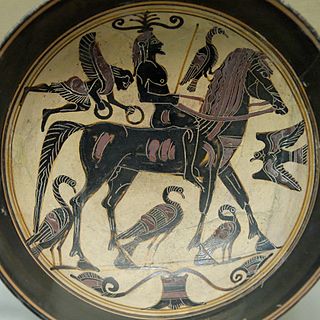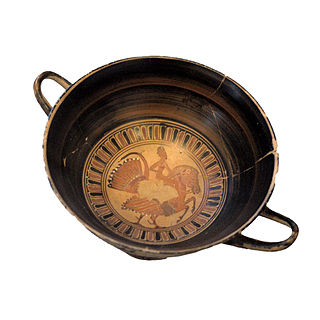
A meniskos (Greek : μηνίσκος, plural Meniskoi: "crescent moon") is a bronze disk mounted above some Greek statues on an iron nail drilled through the statue's head.

A meniskos (Greek : μηνίσκος, plural Meniskoi: "crescent moon") is a bronze disk mounted above some Greek statues on an iron nail drilled through the statue's head.
Since many Greek statues were displayed outside, the meniskos served the simple purpose of preventing bird feces from accumulating on the statue. [1]
Meniskoi are mentioned in Aristophanes' The Birds , when the birds threaten the judges saying:
If you don't vote for us, you should prepare some little metal plates to guard your head. You'll need to wear them, just like statues do. For those of you without that head plate on, when you dress up in fine white brand-new clothes, the birds will crap on as a punishment.

Aristophanes, son of Philippus, of the deme Kydathenaion, was a comic playwright or comedy-writer of ancient Athens and a poet of Old Attic Comedy. Eleven of his forty plays survive virtually complete. These provide the most valuable examples of a genre of comic drama known as Old Comedy and are used to define it, along with fragments from dozens of lost plays by Aristophanes and his contemporaries.

Phidias or Pheidias was a Greek sculptor, painter, and architect. His Statue of Zeus at Olympia was one of the Seven Wonders of the Ancient World. Phidias also designed the statues of the goddess Athena on the Athenian Acropolis, namely the Athena Parthenos inside the Parthenon, and the Athena Promachos, a colossal bronze which stood between it and the Propylaea, a monumental gateway that served as the entrance to the Acropolis in Athens. Phidias was the son of Charmides of Athens. The ancients believed that his masters were Hegias and Ageladas.

Nyx is the Greek goddess of the night. A shadowy figure, Nyx stood at or near the beginning of creation and mothered other personified deities such as Hypnos (Sleep) and Thanatos (Death), with Erebus (Darkness). Her appearances are sparse in surviving mythology, but reveal her as a figure of such exceptional power and beauty that she is feared by Zeus himself.

In Greek mythology, Porphyrion was one of the Gigantes (Giants), who according to Hesiod, were the offspring of Gaia, born from the blood that fell when Uranus (Sky) was castrated by their son Cronus. In some other versions of the myth, the Gigantes were born of Gaia and Tartarus.

Lysistrata is an ancient Greek comedy by Aristophanes, originally performed in classical Athens in 411 BC. It is a comic account of a woman's extraordinary mission to end the Peloponnesian War between Greek city states by denying all the men of the land any sex, which was the only thing they truly and deeply desired. Lysistrata persuades the women of the warring cities to withhold sexual privileges from their husbands and lovers as a means of forcing the men to negotiate peace—a strategy, however, that inflames the battle between the sexes.

Souvlaki, plural souvlakia, is a popular Greek fast food consisting of small pieces of meat and sometimes vegetables grilled on a skewer. It is usually eaten straight off the skewer while still hot. It can be served with pita bread, fried potatoes, lemon, and sauces, but the souvlaki itself is eaten on its own, with the side dishes eaten subsequently. The meat usually used in Greece and Cyprus is pork, although chicken, beef, and lamb may also be used. In other countries, souvlaki may be made with meats such as lamb, beef, chicken, and sometimes fish.

The Birds is a comedy by the Ancient Greek playwright Aristophanes. It was performed in 414 BC at the City Dionysia where it won second place. It has been acclaimed by modern critics as a perfectly realized fantasy remarkable for its mimicry of birds and for the gaiety of its songs. Unlike the author's other early plays, it includes no direct mention of the Peloponnesian War and there are few references to Athenian politics, and yet it was staged not long after the commencement of the Sicilian Expedition, an ambitious military campaign that greatly increased Athenian commitment to the war effort. In spite of that, the play has many indirect references to Athenian political and social life. It is the longest of Aristophanes' surviving plays and yet it is a fairly conventional example of Old Comedy.
Hippocleides, the son of Teisander (Τείσανδρος), was an Athenian nobleman, who served as Eponymous Archon for the year 566 BC – 565 BC.

The large bird genus Columba comprises a group of medium to large pigeons. The terms "dove" and "pigeon" are used indiscriminately for smaller and larger Columbidae, respectively. Columba species – at least those of Columba sensu stricto – are generally termed "pigeons", and in many cases wood-pigeons. The rock dove ,has given rise to the majority of domesticated pigeon breeds, such as the racing pigeon and the fantail pigeon some of which have become feral. Meanwhile, "wood pigeon" by itself usually means the common wood pigeon.
The Frogs is a comedy written by the Ancient Greek playwright Aristophanes. It was performed at the Lenaia, one of the Festivals of Dionysus in Athens, in 405 BC and received first place.

A gold medal is a medal awarded for highest achievement in a non-military field. Its name derives from the use of at least a fraction of gold in form of plating or alloying in its manufacture.
The Acharnians or Acharnians is the third play — and the earliest of the eleven surviving plays — by the Athenian playwright Aristophanes. It was produced in 425 BC on behalf of the young dramatist by an associate, Callistratus, and it won first place at the Lenaia festival.
Old Comedy (archaia) is the first period of the ancient Greek comedy, according to the canonical division by the Alexandrian grammarians. The most important Old Comic playwright is Aristophanes – whose works, with their daring political commentary and abundance of sexual innuendo, effectively define the genre today.

Peace is an Athenian Old Comedy written and produced by the Greek playwright Aristophanes. It won second prize at the City Dionysia where it was staged just a few days before the Peace of Nicias was validated, which promised to end the ten-year-old Peloponnesian War. The play is notable for its joyous anticipation of peace and for its celebration of a return to an idyllic life in the countryside. However, it also sounds a note of caution, there is bitterness in the memory of lost opportunities and the ending is not happy for everyone. As in all of Aristophanes' plays, the jokes are numerous, the action is wildly absurd and the satire is savage. Cleon, the pro-war populist leader of Athens, is once again a target for the author's wit, even though he had died in battle just a few months earlier.

In Greek mythology, Eros is the Greek god of love and sex. His Roman counterpart was Cupid ("desire"). In the earliest account, he is a primordial god, while in later accounts he is described as one of the children of Aphrodite and Ares and, with some of his siblings, was one of the Erotes, a group of winged love gods.

A hippalectryon or hippalektryon, is a type of fantastic hybrid creature of Ancient Greek folklore, half-horse (front) and half-rooster (hind), including the tail, wings and hind legs. Its colour varies between yellow and reddish. No myths related to it are currently known.
Eighteen Epigrams are attributed to Plato, most of them considered spurious. These are short poems suitable for dedicatory purposes written in the form of elegiac couplets.
In Greek, means the evening meal, usually the largest meal of the Ancient Greek day. One famous example from the Ancient Greek sources is "Hekate's Deipnon" which is, at its most basic, a religious offering meal given to the Titan Hekate and the restless dead once a lunar month. Ancient Athenians held that once a lunar month, Hekate led the spirits of the unavenged or wrongfully killed accompanied by hounds from the underworld up from Hades. It is also the last day of the month according to the lunisolar based Attic calendar used in ancient Athens. Where the time of the dark moon was seen as the in-between liminal time between months.
Lopadotemachoselachogaleokranioleipsanodrimhypotrimmatosilphiokarabomelitokatakechymenokichlepikossyphophattoperisteralektryonoptekephalliokigklopeleiolagoiosiraiobaphetraganopterygon is a fictional dish mentioned in Aristophanes' comedy Assemblywomen. It is a transliteration of the Ancient Greek word λοπαδοτεμαχοσελαχογαλεοκρανιολειψανοδριμυποτριμματοσιλφιοκαραβομελιτοκατακεχυμενοκιχλεπικοσσυφοφαττοπεριστεραλεκτρυονοπτοκεφαλλιοκιγκλοπελειολαγῳοσιραιοβαφητρ

The Persian Rider is an archaic Greek equestrian sculpture, c. 520–500, that once stood on the Akropolis, Athens. Only fragmentary remains survive; the lower torso and legs of the rider and the head, forelegs and chest of the horse. It was found west of the Erechtheion in 1886 and reconstructed by Franz Studniczka. Significant amounts of the original surface painting remains on the statue including the multicoloured pattern on the leggings of the rider which is thought to indicate that he was Persian or Scythian, hence the name. The sculpture now stands in the Akropolis Museum.